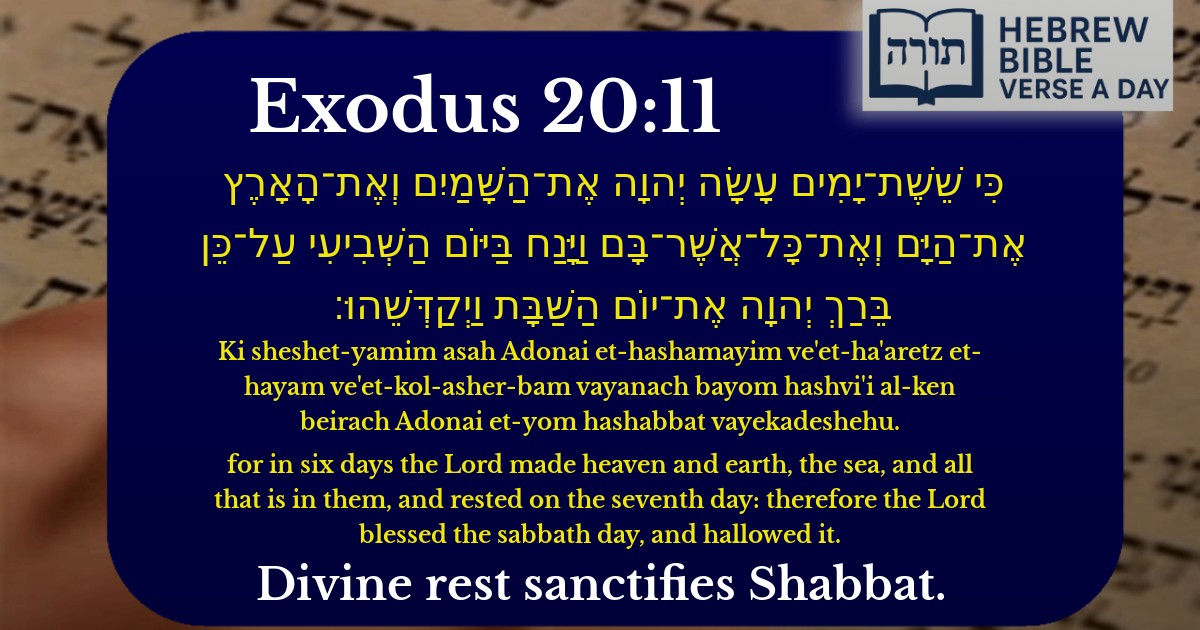Join Our Newsletter To Be Informed When New Videos Are Posted
Join the thousands of fellow Studends who rely on our videos to learn how to read the bible in Hebrew for free!
Hebrew Text
כִּי שֵׁשֶׁת־יָמִים עָשָׂה יְהוָה אֶת־הַשָּׁמַיִם וְאֶת־הָאָרֶץ אֶת־הַיָּם וְאֶת־כָּל־אֲשֶׁר־בָּם וַיָּנַח בַּיּוֹם הַשְּׁבִיעִי עַל־כֵּן בֵּרַךְ יְהוָה אֶת־יוֹם הַשַּׁבָּת וַיְקַדְּשֵׁהוּ׃
English Translation
for in six days the Lord made heaven and earth, the sea, and all that is in them, and rested on the seventh day: therefore the Lord blessed the sabbath day, and hallowed it.
Transliteration
Ki sheshet-yamim asah Adonai et-hashamayim ve'et-ha'aretz et-hayam ve'et-kol-asher-bam vayanach bayom hashvi'i al-ken beirach Adonai et-yom hashabbat vayekadeshehu.
Hebrew Leining Text
כִּ֣י שֵֽׁשֶׁת־יָמִים֩ עָשָׂ֨ה יְהֹוָ֜ה אֶת־הַשָּׁמַ֣יִם וְאֶת־הָאָ֗רֶץ אֶת־הַיָּם֙ וְאֶת־כׇּל־אֲשֶׁר־בָּ֔ם וַיָּ֖נַח בַּיּ֣וֹם הַשְּׁבִיעִ֑י עַל־כֵּ֗ן בֵּרַ֧ךְ יְהֹוָ֛ה אֶת־י֥וֹם הַשַּׁבָּ֖ת וַֽיְקַדְּשֵֽׁהוּ׃ <span class="mam-spi-samekh">{ס}</span>
כִּ֣י שֵֽׁשֶׁת־יָמִים֩ עָשָׂ֨ה יְהֹוָ֜ה אֶת־הַשָּׁמַ֣יִם וְאֶת־הָאָ֗רֶץ אֶת־הַיָּם֙ וְאֶת־כׇּל־אֲשֶׁר־בָּ֔ם וַיָּ֖נַח בַּיּ֣וֹם הַשְּׁבִיעִ֑י עַל־כֵּ֗ן בֵּרַ֧ךְ יְהֹוָ֛ה אֶת־י֥וֹם הַשַּׁבָּ֖ת וַֽיְקַדְּשֵֽׁהוּ׃ {ס}
🎵 Listen to leining
Parasha Commentary
📚 Talmud Citations
This verse is quoted in the Talmud.
📖 Shabbat 118b
The verse is referenced in the context of discussing the importance of observing the Sabbath, emphasizing God's rest on the seventh day as the foundation for the sanctity of the Sabbath.
📖 Sanhedrin 56b
The verse is cited in a discussion about the Noahide laws, particularly the commandment for non-Jews to observe a day of rest, drawing a parallel to the Jewish Sabbath.
📖 Mekhilta d'Rabbi Yishmael Yitro, Bahodesh 7
The verse is quoted in a midrashic exposition on the Ten Commandments, explaining the divine origin and significance of the Sabbath commandment.


The Significance of the Six Days of Creation
Rashi (Exodus 20:11) explains that the verse emphasizes the six days of creation to establish the foundation for Shabbat observance. By stating that Hashem created the world in six days and rested on the seventh, the Torah provides the divine model for humanity to emulate. The Rambam (Hilchot Shabbat 30:2) further elaborates that this serves as a testimony to the belief in creatio ex nihilo (creation from nothing), reinforcing that Hashem is the sole Creator of the universe.
The Concept of Rest on the Seventh Day
The term "וַיָּנַח" (and He rested) does not imply physical fatigue, as Hashem is incorporeal. Rather, as the Ramban (Exodus 20:11) explains, it signifies a cessation from creative activity, establishing a spiritual paradigm. The Mechilta (Yitro 7) teaches that this "rest" symbolizes the completion of creation and the infusion of holiness into time, setting aside the seventh day as distinct from the preceding six.
The Blessing and Sanctification of Shabbat
The verse states that Hashem "בֵּרַךְ" (blessed) and "וַיְקַדְּשֵׁהוּ" (sanctified) the Shabbat. Rashi clarifies that the blessing refers to the manna, which fell in double portion on Friday (Exodus 16:22-29), demonstrating divine providence in enabling Shabbat observance. The sanctification, as the Sforno notes, designates Shabbat as a day set apart for spiritual elevation and connection to Hashem. The Talmud (Beitzah 16a) adds that every Jew receives an additional soul (neshama yetera) on Shabbat, enhancing their capacity for holiness.
Shabbat as a Covenant and Reminder
The Midrash (Bereishit Rabbah 11:2) teaches that Shabbat serves as a perpetual sign of the covenant between Hashem and the Jewish people. By observing Shabbat, we affirm our belief in Hashem as Creator and sustainer of the world. The Rambam (Moreh Nevuchim 2:31) further explains that Shabbat is not merely a day of physical rest but an opportunity for intellectual and spiritual refinement, aligning our lives with divine wisdom.